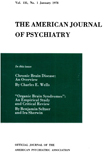A REPORT OF SPONTANEOUS RECOVERY IN TWO CASES OF ADVANCED SCHIZOPHRENIC ORGANISMIC STAGNATION
Abstract
The author has reported the clinical course of two advanced cases of schizophrenic organismic stagnation, in whom recovery from the psychosis occurred spontaneously, because in his opinion they suggest the following constructive points:
1. That schizophrenia is, potentially, a reversible functional disorder of the total organism.
2. That a potentially schizophrenic organism is subject to certain variable susceptivities which do not characterize the relatively normal human organism. Associated with these variable susceptivities is an increased degree of emotional hyperaesthesia, resulting probably from a consensual biochemical heightening of irritability in certain parts of the nervous system, which, for functional reasons peculiar to the schizophrenic organism, becomes reversed into emotional anaesthesia or a condition usually described as "withdrawal."
3. There are schizophrenic organisms and schizophrenic organisms, allomorphic schizophrenic organisms, so to speak, which display a series of related, yet variable, organismis responses and syndromes.
4. Profound schizophrenic stagnation, perse, need not imply irreversibility.
5. In schizophrenia, psychosexual frustration appears to be only an aggravating, or contributory factor in the development of the psychosis.
6. Opinions on prognosis in schizophrenia are only relative and not absolute.
7. Profoundly stagnated schizophrenic patients may recover from the psychosis without narcosynthesis, psychoanalysis, shock therapy, etc., and the field for research into conservative methods of treatment is still virgin soil.
8. The delusions and hallucinations in schizophrenia are symptoms and not causes.
9. Each case of schizophrenia presents an individual constellation of therapeutic problems.
10. All narrow and dogmatic concepts as to the nature of schizophrenia may deprive a patient of possible recovery.
11. A broader, more flexible, and organismically oriented concept of schizophrenia and its treatment seems not only desirable but urgent.
12. Schizophrenia appears to be one aspect of a chronic disorder of the organism, associated with peculiar susceptivities, whose terminal phase is characterized by psychotic manifestations.
Access content
To read the fulltext, please use one of the options below to sign in or purchase access.- Personal login
- Institutional Login
- Sign in via OpenAthens
- Register for access
-
Please login/register if you wish to pair your device and check access availability.
Not a subscriber?
PsychiatryOnline subscription options offer access to the DSM-5 library, books, journals, CME, and patient resources. This all-in-one virtual library provides psychiatrists and mental health professionals with key resources for diagnosis, treatment, research, and professional development.
Need more help? PsychiatryOnline Customer Service may be reached by emailing [email protected] or by calling 800-368-5777 (in the U.S.) or 703-907-7322 (outside the U.S.).



